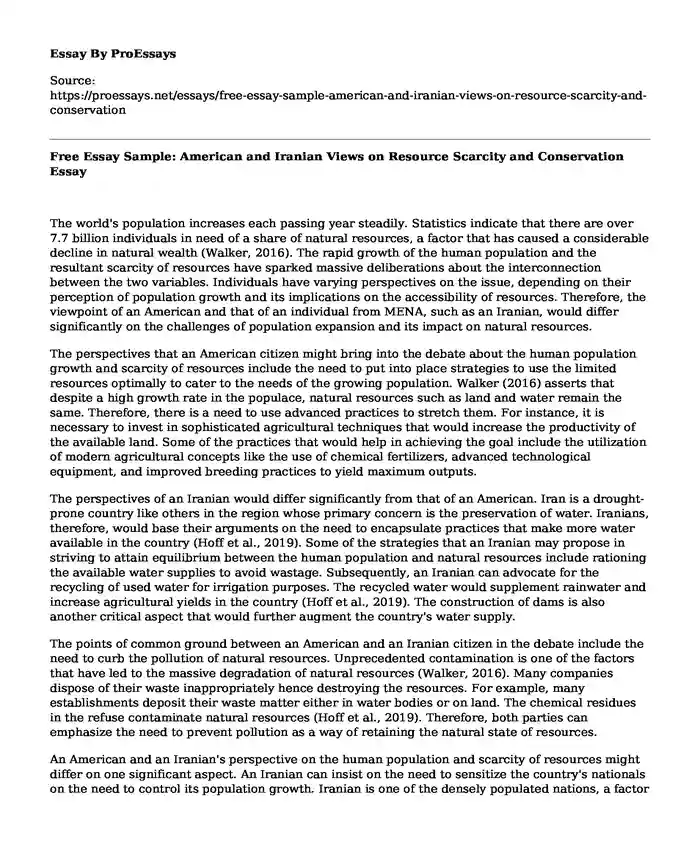The world's population increases each passing year steadily. Statistics indicate that there are over 7.7 billion individuals in need of a share of natural resources, a factor that has caused a considerable decline in natural wealth (Walker, 2016). The rapid growth of the human population and the resultant scarcity of resources have sparked massive deliberations about the interconnection between the two variables. Individuals have varying perspectives on the issue, depending on their perception of population growth and its implications on the accessibility of resources. Therefore, the viewpoint of an American and that of an individual from MENA, such as an Iranian, would differ significantly on the challenges of population expansion and its impact on natural resources.
The perspectives that an American citizen might bring into the debate about the human population growth and scarcity of resources include the need to put into place strategies to use the limited resources optimally to cater to the needs of the growing population. Walker (2016) asserts that despite a high growth rate in the populace, natural resources such as land and water remain the same. Therefore, there is a need to use advanced practices to stretch them. For instance, it is necessary to invest in sophisticated agricultural techniques that would increase the productivity of the available land. Some of the practices that would help in achieving the goal include the utilization of modern agricultural concepts like the use of chemical fertilizers, advanced technological equipment, and improved breeding practices to yield maximum outputs.
The perspectives of an Iranian would differ significantly from that of an American. Iran is a drought-prone country like others in the region whose primary concern is the preservation of water. Iranians, therefore, would base their arguments on the need to encapsulate practices that make more water available in the country (Hoff et al., 2019). Some of the strategies that an Iranian may propose in striving to attain equilibrium between the human population and natural resources include rationing the available water supplies to avoid wastage. Subsequently, an Iranian can advocate for the recycling of used water for irrigation purposes. The recycled water would supplement rainwater and increase agricultural yields in the country (Hoff et al., 2019). The construction of dams is also another critical aspect that would further augment the country's water supply.
The points of common ground between an American and an Iranian citizen in the debate include the need to curb the pollution of natural resources. Unprecedented contamination is one of the factors that have led to the massive degradation of natural resources (Walker, 2016). Many companies dispose of their waste inappropriately hence destroying the resources. For example, many establishments deposit their waste matter either in water bodies or on land. The chemical residues in the refuse contaminate natural resources (Hoff et al., 2019). Therefore, both parties can emphasize the need to prevent pollution as a way of retaining the natural state of resources.
An American and an Iranian's perspective on the human population and scarcity of resources might differ on one significant aspect. An Iranian can insist on the need to sensitize the country's nationals on the need to control its population growth. Iranian is one of the densely populated nations, a factor that contributes to the scarcity of its resources (Hoff et al., 2019). Therefore, it is necessary to reduce the dependence on the country's limited resources by reducing its population growth rate. On the other hand, the population growth in the U. S is significantly low; hence, monitoring and controlling its trends is not a significant concern in the country.
I am pessimistic about the possibility of technological equipment resolving population problems and scarcity of resources. The sophisticated devices can indeed facilitate maximum exploitation of natural resources. For instance, they can reduce the shortage of water in dry regions by drilling boreholes to tap into the reserves embedded deep in the earth's surface. However, technological devices have demerits that can contribute to the depletion of natural resources (Hoffman et al., 2019). For instance, they require fuel whose manufacture destroys forests. The forest cover is essential in the formation of rain and, hence should be preserved. Additionally, the devices emit toxic gases that damage the ozone layer and cause adverse changes in the climate (Walker, 2016). For example, it causes an increase in the incidences of droughts and floods.
Conclusion
In conclusion, the population challenges experienced in the world today have put a significant strain on the available resources. Therefore, countries should strategize on how to protect and preserve their scarce resources. The regions facing significant population challenges, such as those in North Africa and the Middle East, where fertility rates are high, have higher chances of exhausting their natural wealth. Failure to prevent an uncontrolled increase in the number of citizens and preservation of resources will have negative repercussions, including starvation and violent competition for the available resources.
References
Hoff, H., Alrahaife, S. A., El Hajj, R., Lohr, K., Mengoub, F. E., Farajalla, N., ... & Ulrich, A. (2019). A Nexus Approach for the MENA Region—From Concept to Knowledge to Action. Frontiers in Environmental Science, 7, 48. https://doi.org/10.3389/fenvs.2019.00048
Walker, R. J. (2016). Population growth and its implications for global security. American Journal of Economics and Sociology, 75(4), 980-1004. https://doi.org/10.1111/ajes.12161
Cite this page
Free Essay Sample: American and Iranian Views on Resource Scarcity and Conservation. (2023, Dec 13). Retrieved from https://proessays.net/essays/free-essay-sample-american-and-iranian-views-on-resource-scarcity-and-conservation
If you are the original author of this essay and no longer wish to have it published on the ProEssays website, please click below to request its removal:
- The Age of the Late Renaissance in England Essay
- Canadian Adult Education Paper Example
- Essay Example on Model Minority: 19th Century Chinese Immigration to US
- Essay Example on Substance Abuse: Understanding the Dependence Syndrome
- Essay on Colonial Strains: Native-American Relations, Slavery, and Modernity Perspectives
- Research Paper Example on Racial Segregation in the US
- Comparative Analysis: Hygiene Knowledge Among U.S. and Saudi Arabian Students







